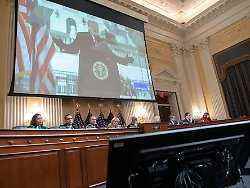planned days before
Committee: March to the Capitol was Trump’s strategy
07/12/2022, 10:13 p.m
The storming of the Capitol is considered a black day for democracy in the United States. A committee of inquiry is to examine what part then-President Trump has in this – and sees a clear connection.
According to the committee of inquiry into the storming of the Capitol in January 2021, then-US President Donald Trump planned the march days earlier – and directly addressed violent right-wing extremists. “President Trump executed his plan by urging his supporters (…) to march to the Capitol in his Jan. 6 speech,” Democratic committee member Stephanie Murphy said at a public hearing. “The evidence confirms that it was not a spontaneous call to action, but a deliberate strategy decided in advance by the President.”
Before Jan. 6, there was information that “very violent individuals” were planning to gather in Washington that day, said Donell Harvin, who was then employed by a security agency in the US capital. It was particularly noteworthy that different groups had formed alliances. Trump loves people who would “viciously defend him in public,” said his former campaign spokeswoman Katrina Pierson. Both had testified behind closed doors. Video excerpts were shown at the hearing.
According to committee member Jamie Raskin, a Trump tweet on December 19 had an “explosive effect” on the right-wing scene and played a central role in mobilizing them. A Twitter employee, whose testimony was presented anonymously at the hearing, said: “We hadn’t seen this type of direct communication before.” For the first time, a president spoke to extremist organizations and gave them instructions. On December 19 – after a meeting with employees that witnesses said got out of hand – Trump tweeted that he called for protests: “Big protest in DC on January 6th. Be there, will be wild !” (roughly: “Strong protest in DC on January 6th. Be there, get wild!”).
At the hearing, statements by right-wing commentators related to this were played. When asked when he decided to go to Washington on January 6, conspiracy theorist Jim Watkins replied: “When the President of the United States announced he was going to hold a rally.” According to their own statements, several confidants at the time advised Trump to give up after the election he lost in November 2020. The committee showed video recordings of various witness interviews behind closed doors. Trump’s former Secretary of Labor Eugene Scalia said: “I told him that I think it’s time for him to acknowledge that President (Joe) Biden won the election.”
“Trump went the opposite way”
Former White House Counsel Pat Cipollone made a similar statement. He was convinced that Trump had to give up. “There is the possibility of contesting elections. But the idea that the federal government could confiscate the voting machines – (…) that’s a terrible idea.” There have long been reports that the White House was discussing confiscating voting machines to investigate allegations of fraud.
“Being on the losing side doesn’t mean you have to be happy about it,” said Democratic committee chair Bennie Thompson. There’s a lot you can do then, but you can’t become violent. “What Donald Trump should have done at that moment, which would have been required of any American leader, was to say, ‘We did our best, but we didn’t make it.’ He went the opposite way.”
On January 6, 2021, supporters of the Republican President violently stormed the seat of parliament in the capital Washington. Congress met there to certify the victory of Trump’s Democratic challenger Joe Biden in the presidential election. The committee is now working on the attack. To this day, Trump claims without any evidence that he was deprived of another election victory through fraud. The 76-year-old leaves open whether he wants to run again in the 2024 presidential election.
